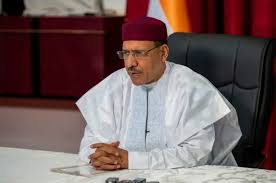APA-Niamey (Niger) – Niger’s military junta claims it has sufficient evidence of treason and financial impropriety against the deposed president.
By Aboubacar Yacouba Barma
As has been the case since the July 26 coup, it was Colonel Major Abdrahmane Amadou, spokesman for the National Council for the Protection of the Homeland (CNSP), who took the floor to respond to the accusations of “hostage-taking,” “arbitrary arrest,” “sequestration,” as well as “bad prison conditions,” “inhuman and criminal treatment” or “illegal detention” of President Bazoum Mohamed, his family and close associates.
One of the latest major announcements made by the junta spokesman in his statement read on public television is the trial of the deposed president for “high treason” and “undermining the security of the state” of Niger.
“To date, the Nigerien government has gathered the necessary evidence to prosecute the deposed president and his local and foreign accomplices before the competent national and international bodies for high treason and undermining the internal and external security of Niger, following his exchanges with nationals, foreign heads of state and officials of international organizations,” announced Colonel Major Adamou, who had previously denounced “fanciful and false allegations made by certain lobbies linked to West African officials at the highest level and their international mentors.”
In the press release, the CNSP and the transitional government also wished to “denounce in the strongest possible terms the campaign of poisoning and disinformation being waged for the sole benefit of an individual and his clan, with the aim of discrediting the transitional authorities of Niger and derailing any negotiated solution to the crisis, in order to better justify a military intervention subcontracted by certain Heads of State to a foreign power in the name of ECOWAS.”
According to the junta spokesman, the new Nigerien authorities wished to express their regret at “this attitude of a certain international community” which, in his words, “consists of showing solidarity with some politicians of the deposed regime, while at the same time lacking empathy with the people of Niger, who have been severely affected by the illegal, inhuman and humiliating sanctions imposed by ECOWAS.”
The junta’s commitment to the “dignified” treatment of detained former regime leaders
Regarding the situation of the leaders of the deposed regime arrested after last month’s coup, the CNSP spokesman reiterated the “firm commitment” of the Nigerien authorities to respect the laws and regulations, as well as Niger’s human rights commitments, and “to treat them humanely in accordance with our traditional and religious values.”
On behalf of the junta and the transitional government, Colonel Major Abdrahmane Adamou categorically denied the accusations of “sequestration” of the deposed president, the sincerity of which he questioned, “even though the military never took over his presidential residence and he still has all the means of communication”, he declared, before pointing out that Bazoum Mohamed “receives regular visits from his doctor”.
The last visit, we recall, took place on Saturday, August 12, 2023, from 11:30 to 15:00, as he recalled, before stressing that after this visit, “the doctor did not detect any problem with the state of health of the deposed president and members of his family, as confirmed by a message from the person concerned to his close relations and the international media”.
Niger jurisdiction
With these accusations, the CNSP intends to initiate legal proceedings against former President Bazoum Mohamed and other officials of the deposed regime. Since the coup, the ousted president, his wife and son have been detained by the military in the presidential palace, and all kinds of reports about the “bad conditions of their detention” have been circulating in the international media and have been taken up by leading personalities and international organizations.
The Economic Community of West African States (ECOWAS), the African Union (AU), the European Union (EU), as well as the United States and France have all expressed concern and called for the “immediate and unconditional release of Bazoum Mohamed, his family and those close to him”.
Human rights organisations have also condemned the conditions of detention of former regime officials arrested by the junta, and in particular the fate reserved for the former head of state, which the UN High Commissioner for Human Rights, Volker Türk, has even described as “degrading and inhuman treatment”.
In a statement issued last Friday, Human Rights Watch (HRW) said that “the military should respect basic human rights, including by releasing those arbitrarily detained. According to HRW, which claims to have interviewed him and some of his relatives on August 9 and 10, “Mohamed Bazoum and his family are being deprived of food, basic services, and legal aid.
This accusation is not the first of its kind in Niger’s transitional history. In 2010, when the Supreme Council for the Restoration of Democracy (CSRD) overthrew former President Tandja Mamadou, and in the face of national and international pressure for what was described as “arbitrary detention”, the former head of state was accused and then charged with “high treason” and “financial malfeasance”.
The legal proceedings thus initiated allowed the military junta in power at the time to keep the former head of state in detention, as he was held in a private residence before being transferred to the civilian prison of Kollo, where he remained incommunicado for 15 months.
AYB/ac/lb/as/APA


